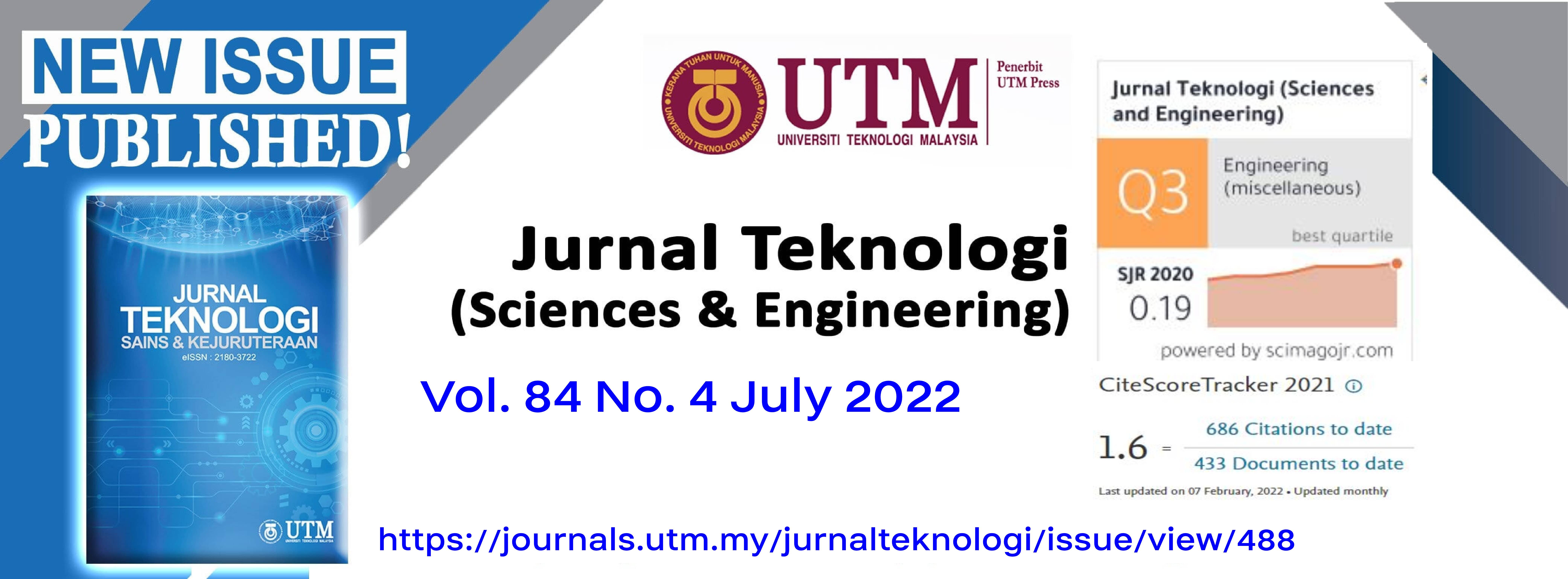POTENCY OF Areca catechu FLESH EXTRACT IN INHIBITING SOFT ROT FUNGI OF MELONS AND BANANAS
DOI:
https://doi.org/10.11113/jurnalteknologi.v84.17252Keywords:
Areca catechu, flesh extract, antifungal, soft rot fungus, decayed fruitsAbstract
Areca fruit (Areca catechu) has traditionally been used as a tooth strengthening and whitener through the habit of “chewing,” in Indonesian culture. In Madura, the use of young areca nuts is an herbal medicine for male virility. Wider utilization has not been performed, even though betel nuts contain bioactive compounds, potentially as antimicrobials. The aim of this research was to obtain evidence for the use of watery extract of betel nuts as a natural ingredient to extend fruits’ shelf life from fungal attacks. The fungus isolated from melon fruit was Meyerozyma sp., and the isolate from banana fruit was Aspergillus sp. Extraction of betel nuts using water as a solvent produces a dark brown concentrated solution. The in vitro antifungal test result showed that the inhibitory activity of areca flesh water extract against fungal isolates was still lower than that of 0.2% ketoconazole. The in vivo test results on “Arumanis” mangoes and “Ambon” bananas with Aspergillus sp. from bananas showed that hyphae had not appeared on days 4 and 5 of storage at room temperature 25 oC, respectively. Areca fruit extract can extend the shelf life of the fruit at room temperature.
References
Vanikhamal, R. R. and Ezhilarasi, B. S. 2016. Phytochemical Qualitative Analysis and Total Tannin Content in the Aqueous Extract of Areca catechu Nut. Asian Journal of Biomedical and Pharmaceutical Sciences. 6(54): 07-09. www.jbiopharm.com.
Salutan, G. L. H. and Billacura, M. P. 2015. Phytochemical Screening, and Evaluation of the Toxicity, Antimicrobial and Anthelmintic Properties of the Different Extracts from the Air-dried Seeds of Areca catechu Linn. Conference: 2015 Annual Philippine-American Academy of Science and Engineering Meeting and Symposium at De La Salle University, Manila, Philippines. Volume: 1. https://www.researchgate.net/publication/316716653.
Zhang, W. M., Huang, W. Y., Chen, W. X., Han, L. and Zhan, H. D. 2014. Optimization of Extraction Conditions of Areca Seed Polyphenols and Evaluation of Their Antioxidant Activities. Molecules. 19: 16416-16427. Doi: 10.3390/molecules191016416.www.mdpi.com/journal/molecules.
Tahmasebi, M., Golmohammadi, A., Nematollahzadeh, A., Davari, M., and Chamani, E. 2019. Control of Nectarine Fruits Postharvest Fungal Rots Caused by Botrytis Cinerea and Rhizopus Stolonifer Via Some Essential Oils. J Food Sci Technol. https://doi.org/10.1007/s13197-019-04197-4.
Amani, M. and Avagyan, G. 2014. Isolation and Identification of Fungal Pathogens on Banana Trees (Musa acuminata L.) in Iran. International Journal of AgriScience. 4(8): 409-413. www.inacj.com.
Anthikat, R. R. N., Michael, A., Kinsalin, V. A., Ignacimuthu, S. 2014. Antifungal Activity of Areca catechu L. International Journal of Pharmaceutical and Clinical Science. 4(1): 1-3. http://www.urpjournals.com.
Bayati, N. J. M. 2016. In-vitro Antibacterial and Antifungal Effect of Areca Nut Extract. Research Journal of Pharmaceutical, Biological and Chemical Sciences. 7(6): 282. biopharm.com.
Alphons, A. B. & Raphael, R. K. 2014. Potential Antimicrobial, Anthelmintic And Antioxidant Properties of Areca catechu L. Root. International Journal of Pharmacy and Pharmaceutical Sciences. 6(6): 201.
Machová, M., Bajer, T., Šilha, D., Ventura, K. and Bajerová, P. 2021. Volatiles Composition and Antimicrobial Activities of Areca Nut Extracts Obtained by Simultaneous Distillation–Extraction and Headspace Solid-Phase Microextraction. Molecules. 26: 7422. https://doi.org/10.3390/molecules26247422.
Cyriac, M. B., Pai, V., Varghese, I., Shantaram, M. and Jose, M. 2012. Antimicrobial Properties of Areca catechu (areca nut) Husk Extracts Against Common Oral Pathogens. IJRAP. 3(1): Jan – Feb 2012.
Pahadia, A., Gawde, R. and Agrawal, S. 2013. Antimicrobial Activity of Hydro Alcoholic Extract of Areca catechu. International Journal of Pharmaceutical Erudition. 3(1): 18-25. www.pharmaerudition.org May 2013.
Rajamani, R., Kuppusamy, S., Shanmugavadivu, M. and Rajmohan, D. 2016. Preliminary Phytochemical Screening of Aqueous Extract of Betel Nut and Betel Leaves. J. Biosci. Nanosci. 3(1). www.ijbsans.com.
Sarpangala, K. B., Sarpangala, M. and Devasya, A. 2017. Antimicrobial Properties of Areca Nut, Areca catechu, L: A Review. Int. J. Res. Ayurveda Pharm. 8(3): 2017. www.ijrap.net.
Xiao, Y., Yang, Y., Yong, J. and Lu, C. 2019. Chemical Components and Biological Activities of Areca catechu L. Biomed Res Rev. 3: 1-4. Doi: 10.15761/BRR.1000131.
Rusdan, A. I. A. 2014. Biopesticide Potential of Phytochemical Extracts from the Nut of Areca catechu L. Againts Mango Fruit Anthracnose. Master of Agricultural Science Thesis. Universiti Putra Malaysia.
Al-Hindi, R. R., Al-Najada, A. R. and Mohamed, S. A. 2011. Isolation and Identification of Some Fruit Spoilage Fungi: Screening of Plant Cell Wall Degrading Enzymes. African Journal of Microbiology Research. 5(4): 443-448. http://www.academicjournals.org/ajmr. Doi: 10.5897/AJMR10.896.
Abdullah, Q., Mahmoud, A., and Al-harethi, A. 2016. Isolation and Identification of Fungal Post-harvest Rot of Some Fruits in Yemen. PSM Microbiology. 1(1): 36-44. www.psmpublishe rs.org.
Ansari, M. A., Anurag, A., Fatima, Z., and Hameed, S. 2013. Natural Phenolic Compounds: A Potential Antifungal Agent. Microbial Pathogens and Strategies for Combating Them: Science, Technology and Education (A. Méndez-Vilas, Ed.). © FORMATEX 2013.
Sidhu, J. S. and Zafar, T. A. 2018. Bioactive Compounds in Banana Fruits and Their Health Benefits. Food Quality and Safety. 2: 183-188. Doi:10.1093/fqsafe/fyy019.
Coelho, E. M., de Souza, M. E. A. O., Corrêa, L. C., Viana, A. C., de Azevêdo, L. C. and dos Santos Lima, M. 2019. Bioactive Compounds and Antioxidant Activity of Mango Peel Liqueurs (Mangifera indica L.) Produced by Different Methods of Maceration. Antioxidants. 8: 102. Doi:10.3390/antiox8040102. www.mdpi.com/journal/antioxidants.
Downloads
Published
Issue
Section
License
Copyright of articles that appear in Jurnal Teknologi belongs exclusively to Penerbit Universiti Teknologi Malaysia (Penerbit UTM Press). This copyright covers the rights to reproduce the article, including reprints, electronic reproductions, or any other reproductions of similar nature.
















